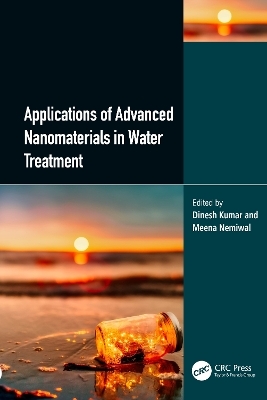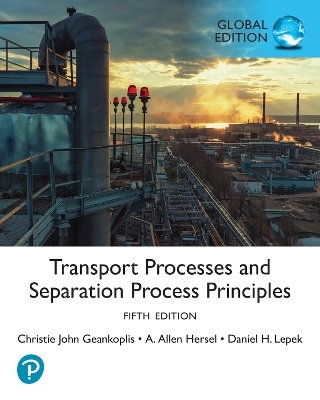
Applications of Advanced Nanomaterials in Water Treatment
CRC Press (Verlag)
978-1-032-18116-5 (ISBN)
- Titel z.Zt. nicht lieferbar
- Versandkostenfrei
- Auch auf Rechnung
- Artikel merken
Water is the most vital substance in every aspect of life, and its contamination because of the activity of mankind poses a big global challenge. Addressing this issue for drinking purposes and environmental protection is the current big issue. Many research groups worldwide have been working on effective treatment technologies based on nanomaterials during the last two decades. Water and wastewater treatment by nanomaterial-based technologies has become an aid in finding possible solutions for contaminated wastewater released from various water sources. Nanoscale materials can be seen to take on unique and unpredictable properties that make them more robust, flexible, lighter, and faster, and the particular material used for the development of devices and systems.
Features:
• This book presents the use of different advanced nanomaterials to treat water and wastewater.
• The uses of carbon-based nanomaterials, metal-organic frameworks (MOFs), and biopolymer-supported nanomaterials for water treatment are explored, focusing on new- generation materials.
• Water purification methods such as the disinfection of water using green synthesized nanomaterials, adsorption through nanomaterial-based adsorbents, and nanofiltration techniques are discussed. We emphasize efficient water treatment methods and the use of new emerging nanomaterials in the toxicological study of nanomaterials.
Nanomaterials provide high-performance and cost-effective treatment for water treatment. Various nanomaterials and electrochemical methods are used to stop, remove, or neutralize water harmful organic and inorganic contaminants in water through adsorption, filtration, and disinfection.
Dinesh Kumar is currently working as Professor in the School of Chemical Sciences at the Central University of Gujarat, Gandhinagar, India. Prof. Kumar obtained his master's and Ph.D. degrees in Chemistry from the Department of Chemistry, University of Rajasthan, Jaipur in 2002 and 2006, respectively. Prof. Kumar has received many national and international awards and fellowships. His research interest focuses on the development of capped MNPs, core-shell NPs, and biopolymers incorporated metal oxide-based nanoadsorbents and nanosensors for the removal and the sensing of health hazardous inorganic toxicants like fluoride and heavy metal ions from aqueous media. Prof. Kumar has developed hybrid nanomaterials from different biopolymers like pectin, chitin, cellulose, and chitosan for water purification. He has also done research on the synthesis of supramolecular metal complexes; metal chelates and their biological effectiveness. He has authored and co-authored over 110 publications in journals of international repute, one book, over seven dozen book chapters and 70 presentations/talks at national/international conferences. Meena Nemiwal is presently an Assistant Professor in Department of Chemistry, Malaviya National Institute of Technology, Jaipur, Rajasthan, India. She obtained her master's and Ph.D. degree from Department of Chemistry, University of Rajasthan, Jaipur in year 2002 and 2007, respectively. She has qualified NET-JRF(CSIR) in 2005 and GATE-2007. She has been in teaching for last 10 years. She did her Ph.D. thesis entitled on “Electrochemical Studies of Metal Ligand Complexes at Dropping Mercury Electrode in Aqueous and Aqueous Non- Aqueous Media”. Her post-doctoral research work also in the field of electrochemical studies of metal-ligand complexes. Her research work was on the study of toxic heavy metals such as lead and cadmium and stability of their complexes with different ligands. Her research interest focusses on the synthesis of functionalised nanoparticles, nanostructured materials and their application for electrode modification in electrochemical sensing of metal ions in water. Dr. Meena has published her research work in reputed journals. She has attended and presented papers in many National and International conferences.
1. Introduction-Nanomaterials and their role in water remediation 2. Advanced carbon-based nanomaterials for treatment of water 3. Metal-Organic Frameworks (MOFs) for water treatment 4. Biopolymers supported nanomaterials for water treatment 5. Disinfection of water by eco-friendly nanomaterials 6.Advanced nanomaterials-based adsorbents for removal and recovery of metals from water 7. Photocatalytic degradation of organic pollutants by using efficient nanomaterials 8. Recent developments in nanofiltration membrane for water purification 9.Electrochemical treatment of water using advanced nanomaterial 10. Nanotoxicology and challenges of using nanomaterials for water treatment.
| Erscheinungsdatum | 02.12.2022 |
|---|---|
| Zusatzinfo | 11 Tables, black and white; 6 Line drawings, color; 23 Line drawings, black and white; 4 Halftones, color; 6 Halftones, black and white; 10 Illustrations, color; 29 Illustrations, black and white |
| Verlagsort | London |
| Sprache | englisch |
| Maße | 152 x 229 mm |
| Gewicht | 720 g |
| Themenwelt | Technik ► Umwelttechnik / Biotechnologie |
| Weitere Fachgebiete ► Land- / Forstwirtschaft / Fischerei | |
| ISBN-10 | 1-032-18116-8 / 1032181168 |
| ISBN-13 | 978-1-032-18116-5 / 9781032181165 |
| Zustand | Neuware |
| Haben Sie eine Frage zum Produkt? |
aus dem Bereich


